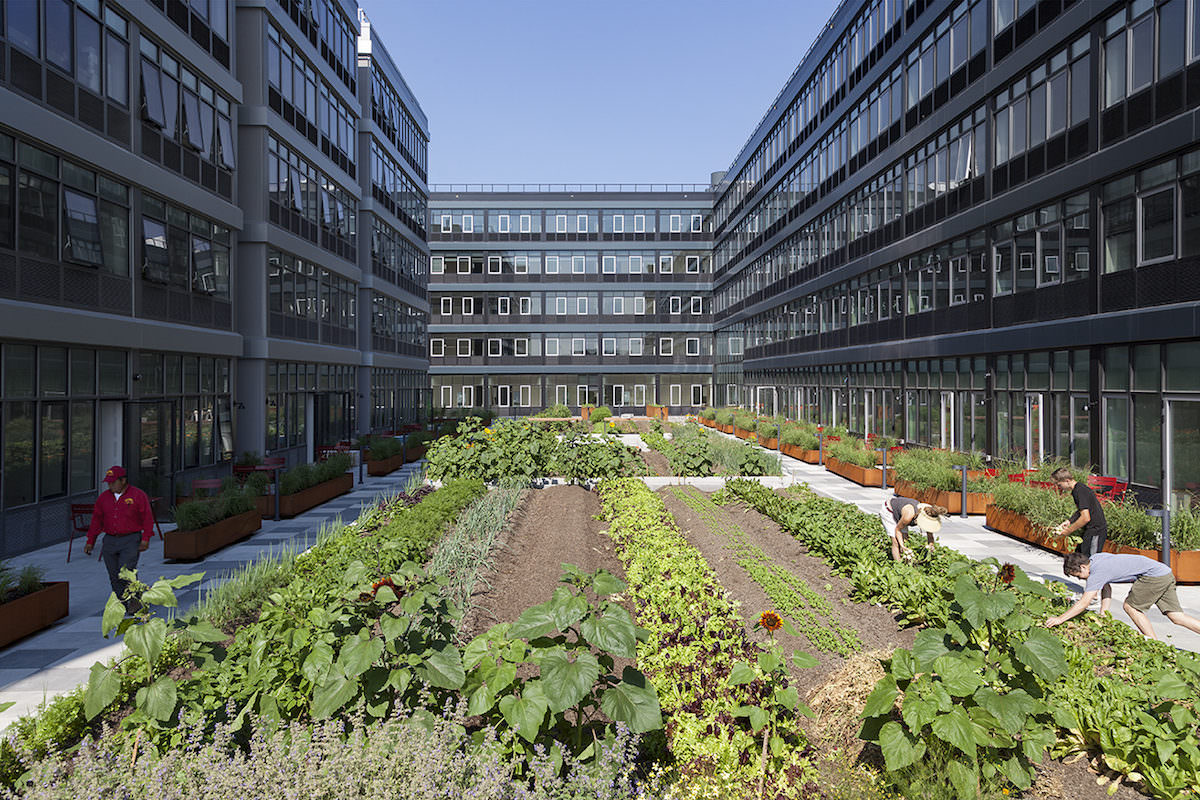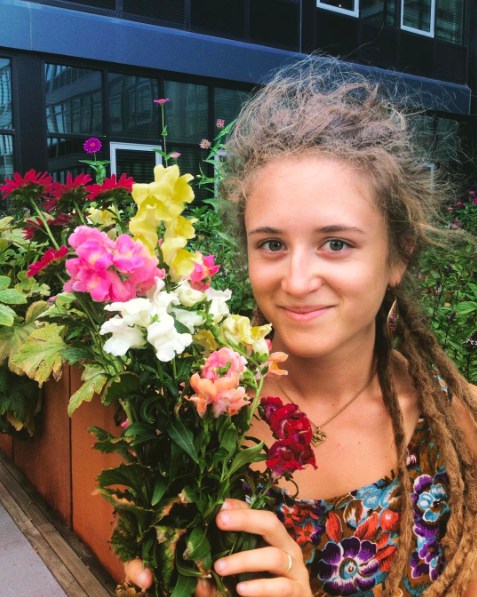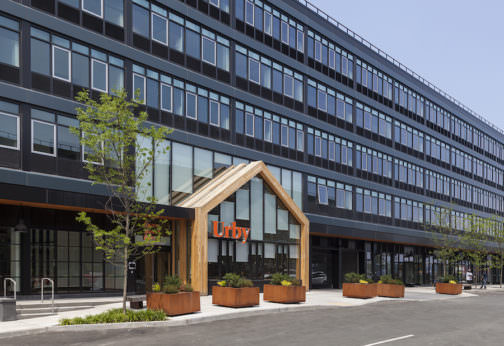Meet the Woman Who Runs NYC’s First Commercial Farm in a Residential Development
Wouldn’t it be great if all apartment complexes came with an urban farm?
Meet the Woman Who Runs NYC’s First Commercial Farm in a Residential Development
Wouldn’t it be great if all apartment complexes came with an urban farm?

Some apartment complexes tout such amenities as pools and weight rooms, but a new development in Staten Island, called Urby, prefers to crow about the organic farm located in the courtyard of one of two rental complexes, which opened earlier this year. They also like to brag about their farmer-in-residence, because if you have an urban farm, you need someone to tend to it, right?
The farmer-in-residence is Zaro Bates, and she’s a 26-year-old from Brooklyn who is running the 4,500-square foot commercial farm built above an underground parking garage. Bates, with the help of her husband and business partner, Asher Landes, 29, who manages the complex’s apiary, are in the midst of their first growing season that’s already produced thousands of pounds of vegetables. Between a weekly farm stand, the three restaurants they supply with vegetables, a “veggie pick-up bundle” (sort of like a CSA, but without the subscription or a season-long commitment), and donations to a local food bank, they’re plowing through the more than 50 types of produce, which includes everything from mustard greens to cutting flowers to Asian broccolini.
In 2013, Bates began consulting on the Urby project, launched by New Jersey-based Ironstate Development, after making a connection through a family friend. She was later hired as the farmer-in-residence, a job that we reported on back in February, which despite a pretty low salary ($15,000 to $20,000 a year) comes with a free apartment. Besides running the farm and their business Empress Green Inc., which includes sustainability consulting services, Bates is also teaching gardening workshops for both residents and the public.


Modern Farmer: How did you get into urban farming?
Zaro Bates: I went to the College of Agriculture and Life Sciences at Cornell University where I studied development sociology. We looked at all of the implications of our global society moving away from being agricultural based toward development of more urban centers. That was kind of my framework for going into doing more hands-on work in urban agriculture. I apprenticed at the Brooklyn Grange in 2013. When I met Asher, we began exploring small-scale farms, both urban and rural, around the world. During our travels I was consulting with Ironstate Development to get ready for the Urby project. Part of the reason we were traveling was to do the research and build the model we were going to launch on Staten Island.
MF: What’s the farm like?
ZB: There’s a parking garage in the sub-level that spans the entire footprint of the building, and the courtyard where the farm is located is on top of the parking garage’s cement roof. There’s a green roof on top of that with about two feet of soil and raised beds within that. We’ve been working there since March trying to get the farm up and running. We’ve had farm stands every weekend since May in the lobby of our building. Urby has a communal kitchen for the residents, but on Saturdays we open it up and the public can shop at our farm stand. We always have music, our chef does cooking demos, and people can come and chat and hang out.
#chefCheech calls these #beauties #naturescandy #empressgarden #urby #nofilter #fromfarmtofoodtruck #supportlocal pic.twitter.com/w1bJTToIM0
– Cheech A’ Cini’s (@cheech_a_cinis) July 14, 2016
@empressgreeninc urban garden @urbylife https://t.co/DT78JMOsQN pic.twitter.com/EeLSuvU7Uk
– Vito Spatafora (@VitoSpata) July 30, 2016
MF: What has been the most challenging aspect of your job so far?
ZB: Since it was the first season we had to build the infrastructure and set up our systems. We really try to practice a lean farm ideal of having everything very organized and having all the systems working in our favor so that we’re efficient. Growing our customer base was an initial problem, but word of mouth and social media have really helped out. At this point it’s about how we can produce more and also grow this into a bigger movement to bring in more local food to this part of Staten Island.
MF: Do you see commercial farms as an amenity becoming a trend?
ZB: I hope so. It makes complete sense and works in everybody’s favor. It would be great if there could be a focus not just on new buildings but also on older buildings, particularly warehouses that are being converted into condos, because they already have the cement roofs that have the structural capacity required for rooftop farming. With new buildings, I think it’s a no-brainer because it’s such a point of attraction for the people coming to live here,but also for the surrounding neighborhood. It’s one of the greatest things that Urby has to offer to the community around us. We’ve had 20 or 30 people tell us they moved here because of the farm and that is just awesome feedback.
Follow us
This work is licensed under a Creative Commons Attribution-NoDerivatives 4.0 International License.
Want to republish a Modern Farmer story?
We are happy for Modern Farmer stories to be shared, and encourage you to republish our articles for your audience. When doing so, we ask that you follow these guidelines:
Please credit us and our writers
For the author byline, please use “Author Name, Modern Farmer.” At the top of our stories, if on the web, please include this text and link: “This story was originally published by Modern Farmer.”
Please make sure to include a link back to either our home page or the article URL.
At the bottom of the story, please include the following text:
“Modern Farmer is a nonprofit initiative dedicated to raising awareness and catalyzing action at the intersection of food, agriculture, and society. Read more at <link>Modern Farmer</link>.”
Use our widget
We’d like to be able to track our stories, so we ask that if you republish our content, you do so using our widget (located on the left hand side of the article). The HTML code has a built-in tracker that tells us the data and domain where the story was published, as well as view counts.
Check the image requirements
It’s your responsibility to confirm you're licensed to republish images in our articles. Some images, such as those from commercial providers, don't allow their images to be republished without permission or payment. Copyright terms are generally listed in the image caption and attribution. You are welcome to omit our images or substitute with your own. Charts and interactive graphics follow the same rules.
Don’t change too much. Or, ask us first.
Articles must be republished in their entirety. It’s okay to change references to time (“today” to “yesterday”) or location (“Iowa City, IA” to “here”). But please keep everything else the same.
If you feel strongly that a more material edit needs to be made, get in touch with us at [email protected]. We’re happy to discuss it with the original author, but we must have prior approval for changes before publication.
Special cases
Extracts. You may run the first few lines or paragraphs of the article and then say: “Read the full article at Modern Farmer” with a link back to the original article.
Quotes. You may quote authors provided you include a link back to the article URL.
Translations. These require writer approval. To inquire about translation of a Modern Farmer article, contact us at [email protected]
Signed consent / copyright release forms. These are not required, provided you are following these guidelines.
Print. Articles can be republished in print under these same rules, with the exception that you do not need to include the links.
Tag us
When sharing the story on social media, please tag us using the following: - Twitter (@ModFarm) - Facebook (@ModernFarmerMedia) - Instagram (@modfarm)
Use our content respectfully
Modern Farmer is a nonprofit and as such we share our content for free and in good faith in order to reach new audiences. Respectfully,
No selling ads against our stories. It’s okay to put our stories on pages with ads.
Don’t republish our material wholesale, or automatically; you need to select stories to be republished individually.
You have no rights to sell, license, syndicate, or otherwise represent yourself as the authorized owner of our material to any third parties. This means that you cannot actively publish or submit our work for syndication to third party platforms or apps like Apple News or Google News. We understand that publishers cannot fully control when certain third parties automatically summarize or crawl content from publishers’ own sites.
Keep in touch
We want to hear from you if you love Modern Farmer content, have a collaboration idea, or anything else to share. As a nonprofit outlet, we work in service of our community and are always open to comments, feedback, and ideas. Contact us at [email protected].by Andrew Amelinckx, Modern Farmer
September 8, 2016
Modern Farmer Weekly
Solutions Hub
Innovations, ideas and inspiration. Actionable solutions for a resilient food system.
ExploreExplore other topics
Share With Us
We want to hear from Modern Farmer readers who have thoughtful commentary, actionable solutions, or helpful ideas to share.
SubmitNecessary cookies are absolutely essential for the website to function properly. This category only includes cookies that ensures basic functionalities and security features of the website. These cookies do not store any personal information.
Any cookies that may not be particularly necessary for the website to function and are used specifically to collect user personal data via analytics, ads, other embedded contents are termed as non-necessary cookies.